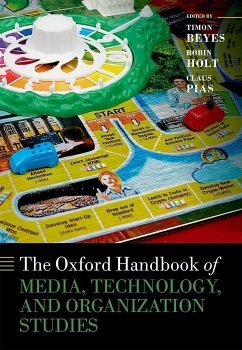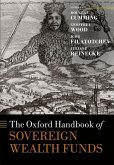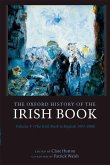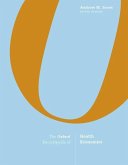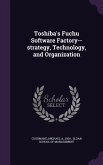The Oxford Handbook of Media, Technology, and Organization Studies
Herausgeber: Beyes, Timon; Pias, Claus; Holt, Robin
The Oxford Handbook of Media, Technology, and Organization Studies
Herausgeber: Beyes, Timon; Pias, Claus; Holt, Robin
- Gebundenes Buch
- Merkliste
- Auf die Merkliste
- Bewerten Bewerten
- Teilen
- Produkt teilen
- Produkterinnerung
- Produkterinnerung
This Handbook explores the largely unchartered territory of media, technology, and organization studies, and interrogates their foundational relations, their forms, and their consequences. The chapters consider how specific mediating technological objects such as the Clock or the Smartphone help us to create organizational form.
Andere Kunden interessierten sich auch für
![The Oxford Handbook of Sovereign Wealth Funds The Oxford Handbook of Sovereign Wealth Funds]() The Oxford Handbook of Sovereign Wealth Funds195,99 €
The Oxford Handbook of Sovereign Wealth Funds195,99 €![Oxford Handbook of Food, Water and Society Oxford Handbook of Food, Water and Society]() Oxford Handbook of Food, Water and Society230,99 €
Oxford Handbook of Food, Water and Society230,99 €![The Oxford Handbook of Industrial Policy The Oxford Handbook of Industrial Policy]() The Oxford Handbook of Industrial Policy251,99 €
The Oxford Handbook of Industrial Policy251,99 €![Oxford History of the Irish Book, Volume V Oxford History of the Irish Book, Volume V]() Patrick WalshOxford History of the Irish Book, Volume V263,99 €
Patrick WalshOxford History of the Irish Book, Volume V263,99 €![The Oxford Encyclopedia of Health Economics The Oxford Encyclopedia of Health Economics]() The Oxford Encyclopedia of Health Economics713,99 €
The Oxford Encyclopedia of Health Economics713,99 €![Toshiba's Fuchu Software Factory--Strategy, Technology, and Organization Toshiba's Fuchu Software Factory--Strategy, Technology, and Organization]() Michael A. CusumanoToshiba's Fuchu Software Factory--Strategy, Technology, and Organization33,99 €
Michael A. CusumanoToshiba's Fuchu Software Factory--Strategy, Technology, and Organization33,99 €![A History of Agriculture and Prices in England: From the Year After the Oxford Parliament (1259) to the Commencement of the Continental War (1793), Vo A History of Agriculture and Prices in England: From the Year After the Oxford Parliament (1259) to the Commencement of the Continental War (1793), Vo]() Arthur George Liddon RogersA History of Agriculture and Prices in England: From the Year After the Oxford Parliament (1259) to the Commencement of the Continental War (1793), Vo48,99 €
Arthur George Liddon RogersA History of Agriculture and Prices in England: From the Year After the Oxford Parliament (1259) to the Commencement of the Continental War (1793), Vo48,99 €-
-
-
This Handbook explores the largely unchartered territory of media, technology, and organization studies, and interrogates their foundational relations, their forms, and their consequences. The chapters consider how specific mediating technological objects such as the Clock or the Smartphone help us to create organizational form.
Hinweis: Dieser Artikel kann nur an eine deutsche Lieferadresse ausgeliefert werden.
Hinweis: Dieser Artikel kann nur an eine deutsche Lieferadresse ausgeliefert werden.
Produktdetails
- Produktdetails
- Verlag: Hurst & Co.
- Seitenzahl: 558
- Erscheinungstermin: 24. Februar 2020
- Englisch
- Abmessung: 251mm x 174mm x 50mm
- Gewicht: 1159g
- ISBN-13: 9780198809913
- ISBN-10: 0198809913
- Artikelnr.: 58444988
- Herstellerkennzeichnung
- Libri GmbH
- Europaallee 1
- 36244 Bad Hersfeld
- gpsr@libri.de
- Verlag: Hurst & Co.
- Seitenzahl: 558
- Erscheinungstermin: 24. Februar 2020
- Englisch
- Abmessung: 251mm x 174mm x 50mm
- Gewicht: 1159g
- ISBN-13: 9780198809913
- ISBN-10: 0198809913
- Artikelnr.: 58444988
- Herstellerkennzeichnung
- Libri GmbH
- Europaallee 1
- 36244 Bad Hersfeld
- gpsr@libri.de
Timon Beyes is Professor of Sociology of Organisation and Culture at Leuphana University of Lüneburg, where he is also a director of the Centre for Digital Cultures (CDC). He holds a fractional professorship at Copenhagen Business School, where he was previously Professor of Design, Innovation and Aesthetics. His work focuses on the processes, spaces, and aesthetics of organization in the fields of digital cultures, art, cities, and higher education. Robin Holt is a professor at the Department of Management, Philosophy and Politics, Copenhagen Business School, and visiting professor at Nottingham Business School. He has an eclectic range of research interests, all of which cohere around questions of organization formation. He is currently undertaking a lengthy study of craft, design, and technology and has recently published a book that investigates strategic judgment as a technology of self-formation. Claus Pias is Professor of Media History and Epistemology at the Institute of Culture and Media Aesthetics (ICAM), Leuphana University of Lüneburg, where he is also a director of the Institute for Advanced Study in Media Cultures of Computer Simulation (MECS) and the Centre for Digital Cultures (CDC). His main areas of interest are the media history and epistemology of computer simulations, the history of media studies, and the field of Digital Cultures.
* Introduction
* 1: François-Regís Puyou and Paolo Quattrone: Account Book
* 2: Reinhold Martin: Acoustic Tile
* 3: Jan Müggenburg: Battery
* 4: Christoph Michels and Chris Steyaert: Bicycle
* 5: Lucas Introna and Lara Pecis: Bitcoin
* 6: Florian Hoof: Calendar
* 7: Markus Krajewski: Card
* 8: Maria-Laura Toraldo and Jeanne Mengis: Chair
* 9: Melissa Gregg and Tamara Kneese: Clock
* 10: John Durham Peters: Cloud
* 11: Götz Bachmann and Paula Bialski: Coffee Machine
* 12: Timon Beyes: Colour Chart
* 13: Alexander Klose: Container
* 14: Mercedes Bunz: Conversational Interface
* 15: Ned Rossiter: Copper
* 16: Monika Dammann: Copy Machine
* 17: Nanna Bonde Thylstrup and Kristin Eva Albrechtsen Veel: Dating
App
* 18: Gibson Burrell and Karen Dale: Desk
* 19: Andreas Bernard: Elevator
* 20: Armin Beverungen: Executive Dashboard
* 21: Wendy Hui Kyong Chun: Filter System
* 22: Mike Zundel: High Heels
* 23: Nishant Shah: Interface
* 24: Aleksandra Przegalinska: Mind Tracker
* 25: Stefan Rieger: Office Plant
* 26: Claus Pias: Overhead Projector
* 27: Alice Comi: Paper Shredder
* 28: Daniel Hjorth: Pen
* 29: Lisa Conrad: Planning Table
* 30: Annika Skoglund: Prezi
* 31: Damian O'Doherty: Price Book
* 32: Roman Duffner: Push Button
* 33: Sine Nørholm Just: Pussyhat
* 34: Christian De Cock: Railway Tracks
* 35: Theodore Vurdubakis: Real Time Bidding System
* 36: Jannis Kallinikos and Cristina Alaimo: Recommender System
* 37: Renée Ridgway: Search Engine
* 38: Jennifer Whyte: Smartphone
* 39: Barara Vinken: Suit
* 40: Mikkel Flyverbom and Anders Koed Madsen: Telegraph
* 41: Robin Holt: Typeface
* 42: Jörg Metelmann: Whiteboard, Flipchart
* 43: Olga Rodak, Tomasz Raburski, and Dariusz Jemielniak: Wiki
* 44: Timon Beyes, Robin Holt, and Claus Pias: By means of which:
Media, Technology, and Organization Studies
* 1: François-Regís Puyou and Paolo Quattrone: Account Book
* 2: Reinhold Martin: Acoustic Tile
* 3: Jan Müggenburg: Battery
* 4: Christoph Michels and Chris Steyaert: Bicycle
* 5: Lucas Introna and Lara Pecis: Bitcoin
* 6: Florian Hoof: Calendar
* 7: Markus Krajewski: Card
* 8: Maria-Laura Toraldo and Jeanne Mengis: Chair
* 9: Melissa Gregg and Tamara Kneese: Clock
* 10: John Durham Peters: Cloud
* 11: Götz Bachmann and Paula Bialski: Coffee Machine
* 12: Timon Beyes: Colour Chart
* 13: Alexander Klose: Container
* 14: Mercedes Bunz: Conversational Interface
* 15: Ned Rossiter: Copper
* 16: Monika Dammann: Copy Machine
* 17: Nanna Bonde Thylstrup and Kristin Eva Albrechtsen Veel: Dating
App
* 18: Gibson Burrell and Karen Dale: Desk
* 19: Andreas Bernard: Elevator
* 20: Armin Beverungen: Executive Dashboard
* 21: Wendy Hui Kyong Chun: Filter System
* 22: Mike Zundel: High Heels
* 23: Nishant Shah: Interface
* 24: Aleksandra Przegalinska: Mind Tracker
* 25: Stefan Rieger: Office Plant
* 26: Claus Pias: Overhead Projector
* 27: Alice Comi: Paper Shredder
* 28: Daniel Hjorth: Pen
* 29: Lisa Conrad: Planning Table
* 30: Annika Skoglund: Prezi
* 31: Damian O'Doherty: Price Book
* 32: Roman Duffner: Push Button
* 33: Sine Nørholm Just: Pussyhat
* 34: Christian De Cock: Railway Tracks
* 35: Theodore Vurdubakis: Real Time Bidding System
* 36: Jannis Kallinikos and Cristina Alaimo: Recommender System
* 37: Renée Ridgway: Search Engine
* 38: Jennifer Whyte: Smartphone
* 39: Barara Vinken: Suit
* 40: Mikkel Flyverbom and Anders Koed Madsen: Telegraph
* 41: Robin Holt: Typeface
* 42: Jörg Metelmann: Whiteboard, Flipchart
* 43: Olga Rodak, Tomasz Raburski, and Dariusz Jemielniak: Wiki
* 44: Timon Beyes, Robin Holt, and Claus Pias: By means of which:
Media, Technology, and Organization Studies
* Introduction
* 1: François-Regís Puyou and Paolo Quattrone: Account Book
* 2: Reinhold Martin: Acoustic Tile
* 3: Jan Müggenburg: Battery
* 4: Christoph Michels and Chris Steyaert: Bicycle
* 5: Lucas Introna and Lara Pecis: Bitcoin
* 6: Florian Hoof: Calendar
* 7: Markus Krajewski: Card
* 8: Maria-Laura Toraldo and Jeanne Mengis: Chair
* 9: Melissa Gregg and Tamara Kneese: Clock
* 10: John Durham Peters: Cloud
* 11: Götz Bachmann and Paula Bialski: Coffee Machine
* 12: Timon Beyes: Colour Chart
* 13: Alexander Klose: Container
* 14: Mercedes Bunz: Conversational Interface
* 15: Ned Rossiter: Copper
* 16: Monika Dammann: Copy Machine
* 17: Nanna Bonde Thylstrup and Kristin Eva Albrechtsen Veel: Dating
App
* 18: Gibson Burrell and Karen Dale: Desk
* 19: Andreas Bernard: Elevator
* 20: Armin Beverungen: Executive Dashboard
* 21: Wendy Hui Kyong Chun: Filter System
* 22: Mike Zundel: High Heels
* 23: Nishant Shah: Interface
* 24: Aleksandra Przegalinska: Mind Tracker
* 25: Stefan Rieger: Office Plant
* 26: Claus Pias: Overhead Projector
* 27: Alice Comi: Paper Shredder
* 28: Daniel Hjorth: Pen
* 29: Lisa Conrad: Planning Table
* 30: Annika Skoglund: Prezi
* 31: Damian O'Doherty: Price Book
* 32: Roman Duffner: Push Button
* 33: Sine Nørholm Just: Pussyhat
* 34: Christian De Cock: Railway Tracks
* 35: Theodore Vurdubakis: Real Time Bidding System
* 36: Jannis Kallinikos and Cristina Alaimo: Recommender System
* 37: Renée Ridgway: Search Engine
* 38: Jennifer Whyte: Smartphone
* 39: Barara Vinken: Suit
* 40: Mikkel Flyverbom and Anders Koed Madsen: Telegraph
* 41: Robin Holt: Typeface
* 42: Jörg Metelmann: Whiteboard, Flipchart
* 43: Olga Rodak, Tomasz Raburski, and Dariusz Jemielniak: Wiki
* 44: Timon Beyes, Robin Holt, and Claus Pias: By means of which:
Media, Technology, and Organization Studies
* 1: François-Regís Puyou and Paolo Quattrone: Account Book
* 2: Reinhold Martin: Acoustic Tile
* 3: Jan Müggenburg: Battery
* 4: Christoph Michels and Chris Steyaert: Bicycle
* 5: Lucas Introna and Lara Pecis: Bitcoin
* 6: Florian Hoof: Calendar
* 7: Markus Krajewski: Card
* 8: Maria-Laura Toraldo and Jeanne Mengis: Chair
* 9: Melissa Gregg and Tamara Kneese: Clock
* 10: John Durham Peters: Cloud
* 11: Götz Bachmann and Paula Bialski: Coffee Machine
* 12: Timon Beyes: Colour Chart
* 13: Alexander Klose: Container
* 14: Mercedes Bunz: Conversational Interface
* 15: Ned Rossiter: Copper
* 16: Monika Dammann: Copy Machine
* 17: Nanna Bonde Thylstrup and Kristin Eva Albrechtsen Veel: Dating
App
* 18: Gibson Burrell and Karen Dale: Desk
* 19: Andreas Bernard: Elevator
* 20: Armin Beverungen: Executive Dashboard
* 21: Wendy Hui Kyong Chun: Filter System
* 22: Mike Zundel: High Heels
* 23: Nishant Shah: Interface
* 24: Aleksandra Przegalinska: Mind Tracker
* 25: Stefan Rieger: Office Plant
* 26: Claus Pias: Overhead Projector
* 27: Alice Comi: Paper Shredder
* 28: Daniel Hjorth: Pen
* 29: Lisa Conrad: Planning Table
* 30: Annika Skoglund: Prezi
* 31: Damian O'Doherty: Price Book
* 32: Roman Duffner: Push Button
* 33: Sine Nørholm Just: Pussyhat
* 34: Christian De Cock: Railway Tracks
* 35: Theodore Vurdubakis: Real Time Bidding System
* 36: Jannis Kallinikos and Cristina Alaimo: Recommender System
* 37: Renée Ridgway: Search Engine
* 38: Jennifer Whyte: Smartphone
* 39: Barara Vinken: Suit
* 40: Mikkel Flyverbom and Anders Koed Madsen: Telegraph
* 41: Robin Holt: Typeface
* 42: Jörg Metelmann: Whiteboard, Flipchart
* 43: Olga Rodak, Tomasz Raburski, and Dariusz Jemielniak: Wiki
* 44: Timon Beyes, Robin Holt, and Claus Pias: By means of which:
Media, Technology, and Organization Studies

